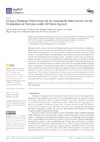Identificador persistente para citar o vincular este elemento:
https://accedacris.ulpgc.es/jspui/handle/10553/107017
| Título: | Using a human interviewer or an automatic interviewer in the evaluation of patients with AD from speech | Autores/as: | Alonso-Hernández, Jesús B. Barragán Pulido, María Luisa Gil Bordón, José Manuel Ferrer Ballester, Miguel Ángel Travieso-González, Carlos M. |
Clasificación UNESCO: | 3314 Tecnología médica | Palabras clave: | Alzheimer’S Disease (Ad) Automatic Interviewer Automatic Voice Recognition Telecare Telemedicine |
Fecha de publicación: | 2021 | Publicación seriada: | Applied Sciences (Switzerland) | Resumen: | Currently, there are more and more frequent studies focused on the evaluation of Alzheimer’s disease (AD) from the automatic analysis of the speech of patients, in order to detect the presence of the disease in an individual or for the evolutionary control of the disease. However, studies focused on analyzing the effect of the methodology used to generate the spontaneous speech of the speaker who undergoes this type of analysis are rare. The objective of this work is to study two different strategies to facilitate the generation of the spontaneous speech of a speaker for further analysis: the use of a human interviewer that promotes the generation of speech through an interview and the use of an automatic system (an automatic interviewer) that invites the speaker to describe certain visual stimuli. In this study, a database called Cross-Sectional Alzheimer Prognosis R2019 has been created, consisting of speech samples from speakers recorded using both methodologies. The speech recordings have been studied through a feature extraction based on five basic temporal measurements. This study demonstrates the discriminatory capacity between the speakers with AD and the control subjects independent of the strategy used in the generation of spontaneous speech. These results are promising and can serve as a basis for knowing the effectiveness and extension of automated interview processes, especially in telemedicine and telecare scenarios. | URI: | https://accedacris.ulpgc.es/handle/10553/107017 | DOI: | 10.3390/app11073228 | Fuente: | Applied Sciences (Switzerland)[EISSN 2076-3417],v. 11 (7), (Abril 2021) |
| Colección: | Artículos |
Citas SCOPUSTM
4
actualizado el 08-jun-2025
Citas de WEB OF SCIENCETM
Citations
3
actualizado el 22-feb-2026
Visitas
163
actualizado el 05-oct-2024
Descargas
127
actualizado el 05-oct-2024
Google ScholarTM
Verifica
Altmetric
Comparte
Exporta metadatos
Los elementos en ULPGC accedaCRIS están protegidos por derechos de autor con todos los derechos reservados, a menos que se indique lo contrario.
